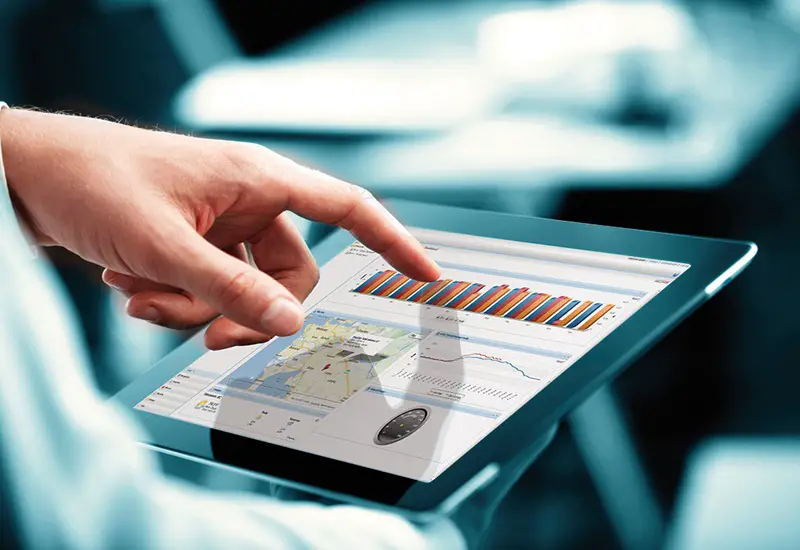
Enterprise resource planning (ERP) integrates a company’s various business processes. In an ERP system, the different software modules work together to provide seamless workflows and facilitate conducting business processes.
As markets evolve, the ERP software businesses use also evolves to support the new business processes, and the products and services they offer. Running behind the scenes, ERP software provides your business with a centralized, single source of data to help you run your business.
As new technologies emerge, they will have a dramatic impact on ERP software. Several new technologies are already poised to impact the evolution of ERP in the coming years:
- Blockchain: A centralized ledger that is used to provide secure communication.
- Internet of Things: A network of devices containing embedded sensors, software, and communication technology.
- Robotic Process Automation: Software-defined robots designed to automate repetitive tasks.
- Artificial Intelligence/Machine Learning: Machines designed to perform tasks and achieve goals.
Blockchain
Blockchain technology was originally developed to provide cryptocurrencies with a single, distributed ledger for recording and verifying transactions. The chain contains many nodes, and each node contains a complete copy of the blockchain. That is, each node gets a copy of every transaction. Each new transaction becomes part of a “block” that gets added to the ledger after being verified by a specified number of nodes. Because of the distributed nature of the ledger, there is no single point of failure that will result in the ledger becoming inaccessible. There are different blockchain applications that are carefully researched and implemented to create a strong cybersecurity.
ERP software of the future will leverage blockchain and cloud technology to ensure that the distributed ledger is up to date and accurate. The data in the blockchain ledger would be stored on and validated by all participants, enabling your supply chain and logistics teams to collaborate seamlessly. In addition, every node would contain the same data—a single version of the truth. This would enable accurate and complete reporting across the business and provide you with a trackable chain of communication for every transaction.
Internet of Things
The Internet of Things (IoT) is a concept that has become ubiquitous. The technology is everywhere around us—from “smart refrigerators” that allow you to see what’s in your fridge while you are grocery shopping, to Wi-Fi–enabled vehicles that may someday replace the human driver. As more and more IoT devices are developed and purchased by consumers, the world becomes more interconnected every day.
IoT technology could enhance the ability of ERP software to capture data from transactions and communicate with other systems in real time to improve business processes. Chips could be installed in equipment and across the premises—capturing data on environment, process flow, and throughput and communicating it in real time with reporting systems.
Similarly, chips could be integrated into your products, potentially giving your company valuable information about how your products are being used in the real world. Customer relationship management (CRM) systems could leverage this information to provide direction to future generations of products, making your business more responsive to your customers. In addition, your company could gain valuable insight into product failures and warranty claims and be alerted to issues in a timely fashion, allowing for more prompt responses than ever before.
Robotics Process Automation
Conceptually, robotic process automation (RPA) isn’t about robots in the traditional sense. Instead, it focuses on “software robots” that can be used to automate business processes or interact with business systems via application programming interfaces (APIs). The software robot can act like a human agent, using virtual keyboards, mice, and monitors to interact with computer systems.
RPA could be used to automate mundane, repetitive tasks performed by humans in the ERP system, freeing up the people who used to do those tasks to do other things. In some cases, this may result in real humans losing real jobs. However, many businesses will give these freed-up resources the opportunity to move on to greater roles.
As the robots need to be developed and trained, RPA comes with a higher up-front cost. But the long-term benefit of leveraging RPA could result in significant financial gains for companies.
Artificial Intelligence/Machine Learning
Artificial intelligence (AI) refers to machines demonstrating intelligence, similar to that displayed by a human or another animal. In the computer industry, the term is used to describe software or machines that are aware of their surroundings, have goals, and can take actions toward achieving those goals. As they take action, the machines monitor the results and “learn,” so that subsequent actions move them closer toward their goals. As a result, AI is often referred to as “machine learning.”
One potential use of artificial intelligence for ERP software is “unsupervised machine learning.” This refers to giving AI access to unstructured data, allowing it to analyze the data and come up with innovative actions. Another potential use is to provide AI with ERP data and direct it to predict issues and potential mitigation strategies, allowing your company to avoid the issue altogether.
An Intriguing Future for ERP
The four technologies covered in this article could all work together to provide ERP systems of the future with functionality that is in the realm of science fiction today. IoT devices could gather information throughout the manufacturing, distribution, and consumer use processes. Blockchain technology would give your company a distributed, secure ledger for all captured data. RPA and AI could then analyze the gathered information, providing your business with insight into your products, product usage, and the customer that will enable you to take your business to the next level of success.
[Image via: Google Images]

when combined with Cloud and Artificial Intelligence (AI), ERP can produce results that can contribute to your revenue growth exponentially.